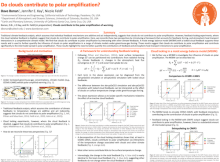Do clouds contribute to polar amplification?
David
Bonan
California Institute of Technology
Poster
Traditional climate feedback analysis, which assumes that individual feedback mechanisms are additive and act independently, suggests that clouds do not contribute to polar amplification. However, feedback locking experiments, where the cloud radiative feedback is disabled, suggest that clouds do contribute to polar amplification. Here, we reconcile these two perspectives by introducing a framework that accounts for feedback, forcing, and atmospheric heat transport interactions in a comprehensive climate model. We find that clouds can contribute to polar amplification by interacting with other climate feedbacks and atmospheric heat transport. A moist energy balance model (MEBM) with a locked cloud feedback exhibits similar behavior and is used to further quantify the influence of clouds on polar amplification in a range of climate models under greenhouse-gas forcing. These results highlight the need to better quantify the contributions of feedback and atmospheric heat transport interactions to polar amplification.

bonan-david-polar-poster.pdf
(1.55 MB)
